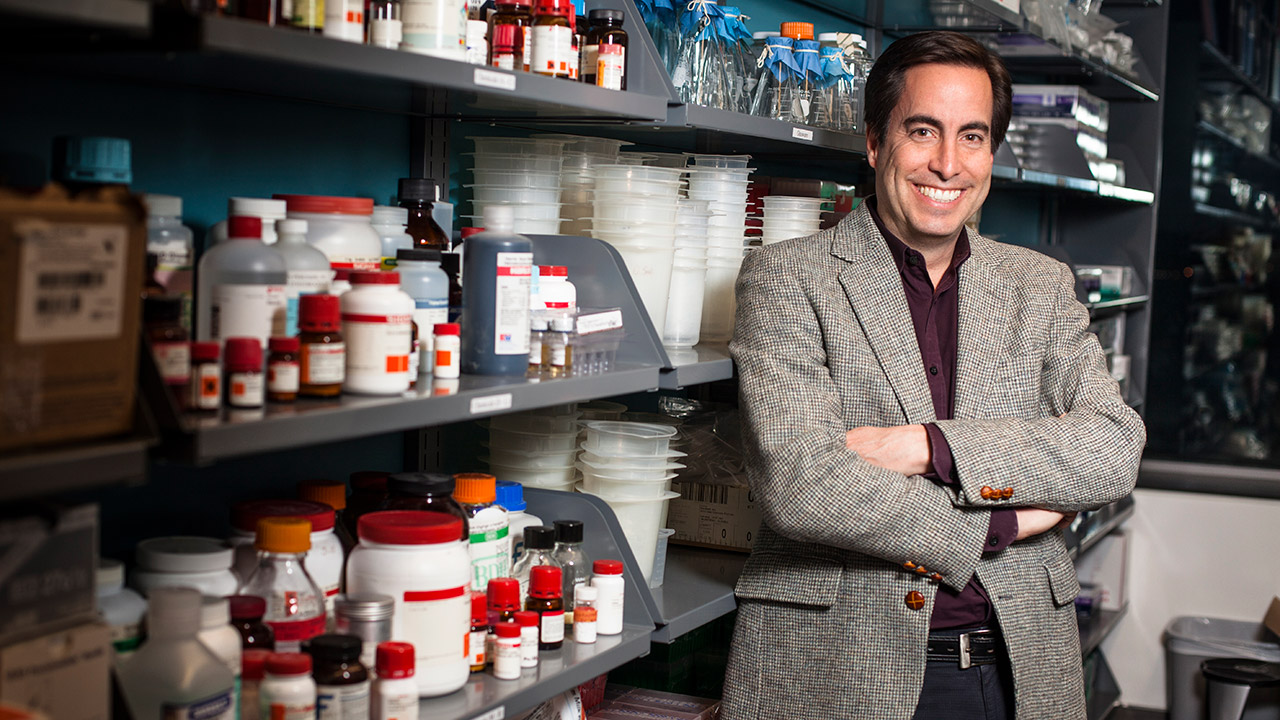Scientists secure investment for groundbreaking trials on stem cell-based therapies
Drs. Juan Carlos Zúñiga-Pflücker and Marc Jeschke, senior scientists in Biological Sciences at Sunnybrook Research Institute (SRI), have received grants that will allow them to elevate their leading-edge research in the field of regenerative medicine. Their funds from the Ontario Institute for Regenerative Medicine (OIRM), together worth $350,000, will go toward projects centred on the use of stem cells to repair the immune system and burned skin, respectively.
“We’re very pleased to learn that the efforts of JC and Marc have been recognized, and that they’ve been provided the means to advance their important work. At SRI we are dedicated to getting results out of the lab and into the clinic, and the projects of JC and Marc are prime examples of such translation,” says Dr. Michael Julius, vice-president of research at SRI and Sunnybrook.
Building upon Zúñiga-Pflücker’s previous work, his one-year $250,000 Disease Team Grant will go toward a project that is an answer to a chemotherapy drawback. He and co-investigator Dr. Donna Wall at SickKids will team up with colleagues to engineer mass quantities of progenitor T cells, which are produced from blood stem cells, and deliver them to people following radiation. A type of white blood cell, T cells develop in the thymus and are critical in helping the body ward of infectious diseases. When people receive chemotherapy to target leukemia and are then given stem cell transplants, it’s been found that their T cell production is diminished. This makes these people vulnerable to infections and cancer relapse.
“The research being supported by the OIRM will address an important clinical need, which is to establish a better and faster way to allow new T cells to emerge in patients receiving a bone marrow stem cell transplant. As T cells are an important player in our immune system, having these cells recover faster is an important outcome,” says Zúñiga-Pflücker, who holds the Canada Research Chair in Developmental Immunology. It will be the first clinical trial to validate the safety and effectiveness of progenitor T cells.
Zúñiga-Pflücker, who is also the chair of and a professor in the department of immunology at the University of Toronto, adds, “The impact of our work comes from our ability to direct the differentiation of stem cells into T cells, which can then be given to patients in need of new T cells to ensure that their immune system is fully functional.” He notes that he and his collaborators were “delighted” to learn that OIRM had decided to invest in their project, which has also earned funding support from Miltenyi Biotec, the Centre for Commercialization of Regenerative Medicine and the Canadian National Transplant Research Program. Providing leveraged funds through other grants are Medicine by Design and the Canadian Institutes of Health Research.
Jeschke, who is also a professor in the department of immunology at U of T, is the director of the Ross Tilley Burn Centre at Sunnybrook. His one-year Accelerator Grant from OIRM, worth $100,000, will support his work in treating burned skin. He has developed a skin substitute—engineered using stem cells—that has shown to be beneficial in preclinical models. The focus now shifts toward testing the approach on humans. “This is the first trial to use autologous stem cells [cells derived from the same person they will be used to treat] in the setting of burns,” he says. “This trial could change the way we treat burn patients in terms of skin replacement and wound healing. We also believe it could improve long-term outcomes of burn patients.”
Looking ahead, Jeschke sees much promise in the possible effects of the work, which has also received funding from Integra LifeSciences. “The potential impact could be huge. If this approach is successful, it would indicate that stem cells can in fact be used to create autologous skin and accelerate and improve wound regeneration.”
He adds, “We are very excited because this enables an outside-the-box study. Obtaining kick-off funds is very important as it could launch a much larger trial and study that would look at this approach on a larger scale.”
Recipients of OIRM funds were announced May 9 at the institute’s annual Stem Cell and Regenerative Medicine Symposium in Toronto. A total of $2.6 million was distributed across 16 Ontario research programs.
The Canada Foundation for Innovation provided infrastructure support for this research through its funding of the Centre for Research in Image-Guided Therapeutics.
In a nutshell
- Two scientists at Sunnybrook Research Institute have received a total of $350,000 to enhance their work in regenerative medicine.
- They will use the funds to lead clinical trials using stem cells that will be the first of their kind.
- The awards are from the Ontario Institute for Regenerative Medicine.



